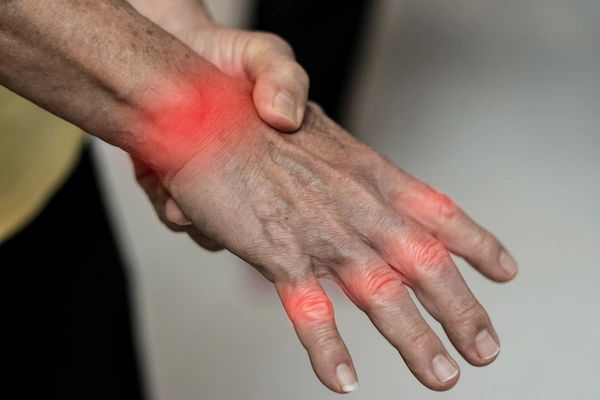Early Signs of Rheumatoid Arthritis Don't Ignore These Symptoms
Learn about the early signs of rheumatoid arthritis, from joint pain and stiffness to systemic symptoms. Discover causes, risk factors, diagnosis, and when to seek medical advice.


Introduction
Rheumatoid arthritis (RA) is far more than just occasional joint pain; it's a chronic autoimmune disease where the body's immune system mistakenly attacks its own tissues, primarily the lining of the joints (the synovium). This leads to painful swelling, potential joint deformity, and can even damage other body systems. Recognising the early signs of rheumatoid arthritis is crucial because early intervention can dramatically slow the disease's progression and prevent long-term damage. This guide will walk you through the subtle and not-so-subtle symptoms, helping you understand what to look for and when it's time to seek professional medical advice. We'll delve into the common rheumatoid arthritis signs, the underlying causes, and the diagnostic process.
The First Whisper: Early Signs and Symptoms
The onset of RA can be insidious, often starting with mild, intermittent symptoms that are easy to dismiss. However, paying attention to these early whispers can make a world of difference. The early symptoms of rheumatoid arthritis often develop gradually over several weeks or months, though they can sometimes appear more rapidly.
Joint Pain and Tenderness
One of the most common first complaints is a persistent aching or throbbing pain in the joints. This is often worse in the mornings or after periods of inactivity. The pain is typically felt throughout the entire joint, not just on one side. The tenderness is significant enough that even the pressure of a bedsheet or light touch can be uncomfortable.
Morning Stiffness: A Hallmark Sign
While many with arthritis experience some stiffness, the morning stiffness associated with RA is distinct. It typically lasts for 30 minutes or longer, and often for several hours. This prolonged duration is a key differentiator from the shorter-lived stiffness of osteoarthritis. People describe it as a feeling of the joints being "locked" or "gelled," requiring time and movement to "loosen up."
Joint Swelling and Warmth
Affected joints often become visibly swollen due to inflammation of the synovial lining. This swelling can make the joint appear puffy or red, and it often feels warm to the touch. The swelling is a direct result of the autoimmune response and is a clear sign that something is wrong.
Symmetrical Symptoms: A Key Differentiator
Perhaps the most telling rheumatoid arthritis sign is its symmetrical pattern. If the knuckles on your right hand are inflamed and painful, it's highly likely that the same knuckles on your left hand will be affected as well. This bilateral symmetry is a classic feature that helps doctors distinguish RA from other types of arthritis.
Beyond the Joints: Systemic and "Invisible" Symptoms
RA is a systemic disease, meaning it can affect the entire body. This leads to a host of "invisible" symptoms that are just as debilitating as joint pain but are often harder for others to see and understand.
Overwhelming Fatigue and Malaise
Before joint pain even becomes prominent, many people experience a deep, unshakable sense of exhaustion. This rheumatoid arthritis fatigue is not simply feeling tired; it's a profound lack of energy that rest doesn't fix. It's often accompanied by a general feeling of being unwell or having the flu (malaise), which is a direct result of the body being in a constant state of inflammation.
Low-Grade Fever and Flu-Like Feelings
A persistent, low-grade fever (often around 99–100°F or 37–38°C) can occur, especially during flares. This, combined with the fatigue and malaise, often leads people to believe they are fighting a virus that never seems to go away.
Loss of Appetite and Weight Loss
The inflammatory chemicals (cytokines) released during an autoimmune response can suppress appetite and rev up metabolism, leading to unintended weight loss. This is your body diverting energy away from normal functions to deal with what it perceives as a constant threat.
What Triggers the Onset? Causes and Risk Factors
The exact cause of RA remains unknown, but research points to a combination of genetic and environmental factors that conspire to trigger the disease.
The Role of Genetics and Family History
Certain genes, like the HLA (human leukocyte antigen) genes, can make you more susceptible to developing RA. Having a close family member (parent or sibling) with the disease increases your risk, indicating a genetic and family history component. However, not everyone with these genes develops RA, and many with RA don't have a family history, proving genes are not the sole factor.
Consult a Specialist for the best advice
Environmental Triggers and Infections
For those with a genetic predisposition, an external trigger may be needed to activate the disease. Studies have investigated potential links to certain bacterial or viral infections (like the Epstein-Barr virus), which might "confuse" the immune system. Other potential environmental triggers include exposure to silica or asbestos, and notably, smoking is one of the most well-established and significant risk factors.
The Link to Hormones and Lifestyle
RA is more common in women than men, suggesting hormones may play a role. Fluctuations in oestrogen levels might influence the immune system. Furthermore, lifestyle factors like obesity put extra stress on joints and produce pro-inflammatory chemicals from fat tissue, potentially exacerbating the risk or severity.
How is Rheumatoid Arthritis Diagnosed?
Diagnosing RA early is critical. There is no single test; instead, doctors use a combination of methods to build a complete picture.
The Importance of a Physical Examination
A doctor, often a rheumatologist, will begin by discussing your medical history and symptoms in detail. They will physically examine your joints for swelling, redness, warmth, and range of motion, and check your reflexes and muscle strength.
Blood Tests: RF and Anti-CCP
Blood tests are crucial. They look for:
• Rheumatoid Factor (RF): An antibody found in about 80% of people with RA.
• Anti-Cyclic Citrullinated Peptide (anti-CCP): A more specific test than RF. A positive result is a very strong indicator of RA.
• Erythrocyte Sedimentation Rate (ESR) and C-Reactive Protein (CRP): These test for markers of inflammation in the body.
If your condition does not improve after trying over-the-counter methods, consult a doctor online with Apollo24|7 for further evaluation. They can guide you on the necessary diagnostic steps.
Imaging: X-rays, Ultrasounds, and MRIs
Early in the disease, X-rays may appear normal. However, they can be used as a baseline to track progression. Ultrasound and MRI are more sensitive and can detect early inflammation and erosion in the joints that an X-ray might miss.
Apollo24|7 offers convenient home collection for tests like CRP and ESR, making the initial diagnostic process smoother.
Conclusion: Taking the Next Step Towards Health
Recognising the early signs of rheumatoid arthritis is the first and most critical step towards managing this chronic condition. While the symptoms can be frightening and overwhelming, modern medicine has made incredible strides in treating RA. Effective treatments, including advanced medications, can control inflammation, relieve pain, prevent joint damage, and help you maintain a good quality of life.
If you or a loved one are experiencing a combination of the symptoms described—especially persistent joint pain, significant morning stiffness, and overwhelming fatigue—it is essential not to dismiss them. Listen to your body. Your call to action is clear: schedule a consultation with a healthcare professional. A prompt and accurate diagnosis is your gateway to effective treatment and long-term well-being. If symptoms persist beyond two weeks, consult a doctor online with Apollo24|7 for further evaluation and a personalised care plan.
Consult a Specialist for the best advice
Consult a Specialist for the best advice

Dr. Vivek D
General Physician
4 Years • MBBS
Bengaluru
PRESTIGE SHANTHINIKETAN - SOCIETY CLINIC, Bengaluru

Dr Syed Mateen Pasha
General Physician
2 Years • MBBS
Bengaluru
PRESTIGE SHANTHINIKETAN - SOCIETY CLINIC, Bengaluru

Dr. Anand Ravi
General Physician
2 Years • MBBS
Bengaluru
PRESTIGE SHANTHINIKETAN - SOCIETY CLINIC, Bengaluru

Dr. Syed Ismail Ali
General Practitioner
7 Years • MBBS
Hyderabad
Apollo 24|7 Clinic, Hyderabad

Dr. Debajyoti Goswami
Obstetrician and Gynaecologist
10 Years • MBBS,D.G.O(DNB),Adv. Infertility Tech.(AIIMS),Fellowship in Diabetes(U.K),Comprehensive Abortion Care(Govt. Of W.B), Certificate in Clinical Embryology(AIIMS, BHUBANESWAR)
Bankura
D.G Clinic, Bankura
(25+ Patients)
Consult a Specialist for the best advice

Dr. Vivek D
General Physician
4 Years • MBBS
Bengaluru
PRESTIGE SHANTHINIKETAN - SOCIETY CLINIC, Bengaluru

Dr Syed Mateen Pasha
General Physician
2 Years • MBBS
Bengaluru
PRESTIGE SHANTHINIKETAN - SOCIETY CLINIC, Bengaluru

Dr. Anand Ravi
General Physician
2 Years • MBBS
Bengaluru
PRESTIGE SHANTHINIKETAN - SOCIETY CLINIC, Bengaluru

Dr. Syed Ismail Ali
General Practitioner
7 Years • MBBS
Hyderabad
Apollo 24|7 Clinic, Hyderabad

Dr. Debajyoti Goswami
Obstetrician and Gynaecologist
10 Years • MBBS,D.G.O(DNB),Adv. Infertility Tech.(AIIMS),Fellowship in Diabetes(U.K),Comprehensive Abortion Care(Govt. Of W.B), Certificate in Clinical Embryology(AIIMS, BHUBANESWAR)
Bankura
D.G Clinic, Bankura
(25+ Patients)
More articles from Rheumatoid Arthritis Treatment
Frequently Asked Questions
1. What is the earliest sign of rheumatoid arthritis?
While it varies, one of the very earliest signs is often prolonged morning stiffness or a deep feeling of fatigue and malaise that precedes noticeable joint swelling.
2. Can rheumatoid arthritis come on suddenly?
Yes, in some cases. While it often develops gradually, a subset of patients can experience a rapid 'explosive' onset where severe symptoms appear over just a few days.
3. What is the difference between RA and osteoarthritis?
Osteoarthritis is caused by mechanical wear-and-tear on joint cartilage. RA is an autoimmune disease where the body attacks its own joints. RA causes inflammatory symptoms (prolonged stiffness, warmth, systemic fatigue), is often symmetrical, and can affect body systems beyond the joints.
4. At what age does rheumatoid arthritis typically start?
RA can begin at any age, but the most common onset is between the ages of 30 and 60. When it starts in children under 16, it is classified as Juvenile Idiopathic Arthritis.
5. Can you have a mild case of rheumatoid arthritis?
Yes, the severity can range from mild to severe. Some people experience mild symptoms with long periods of remission, while others have a more aggressive, progressive form of the disease. Early treatment aims to keep the disease in a mild or dormant state.
